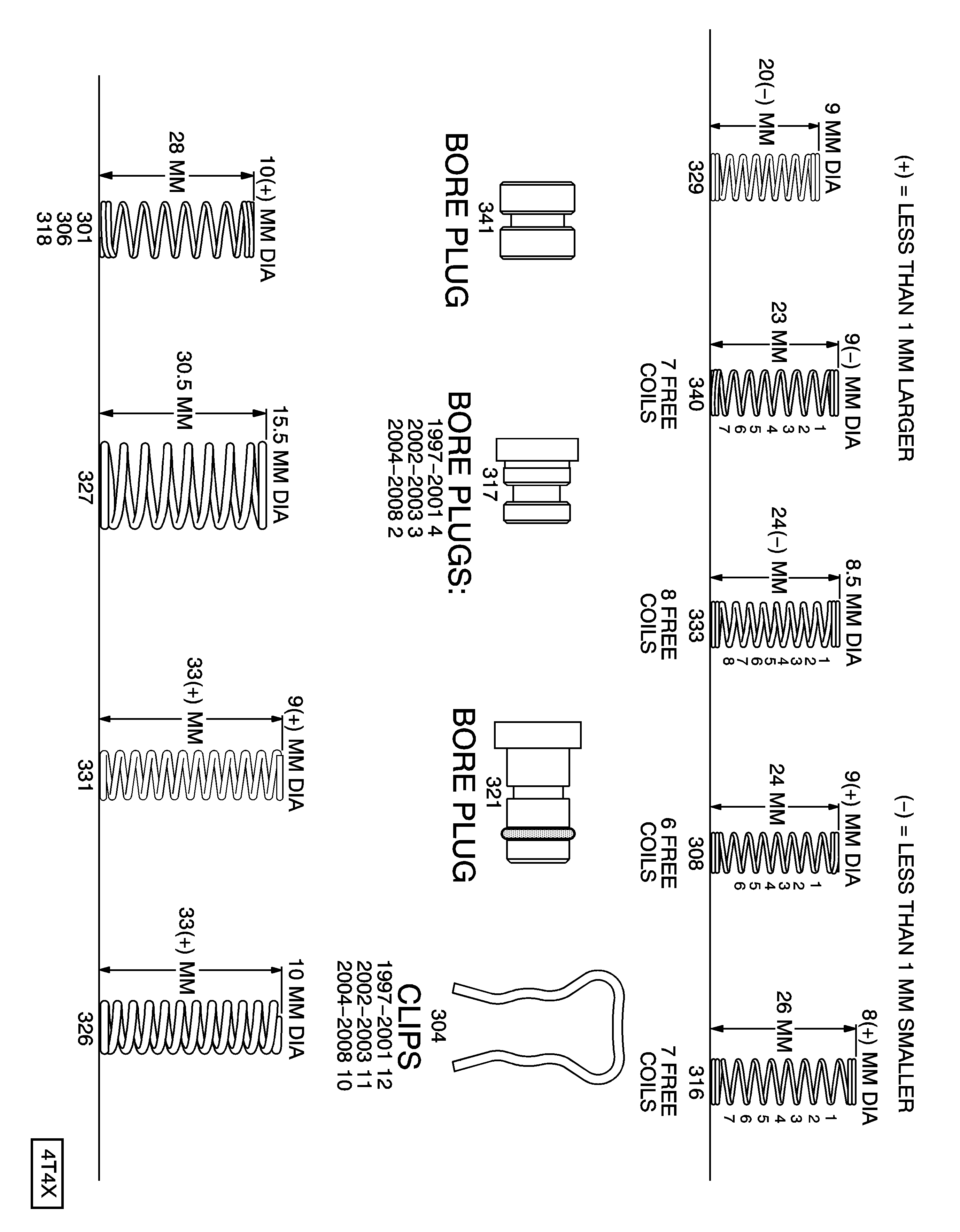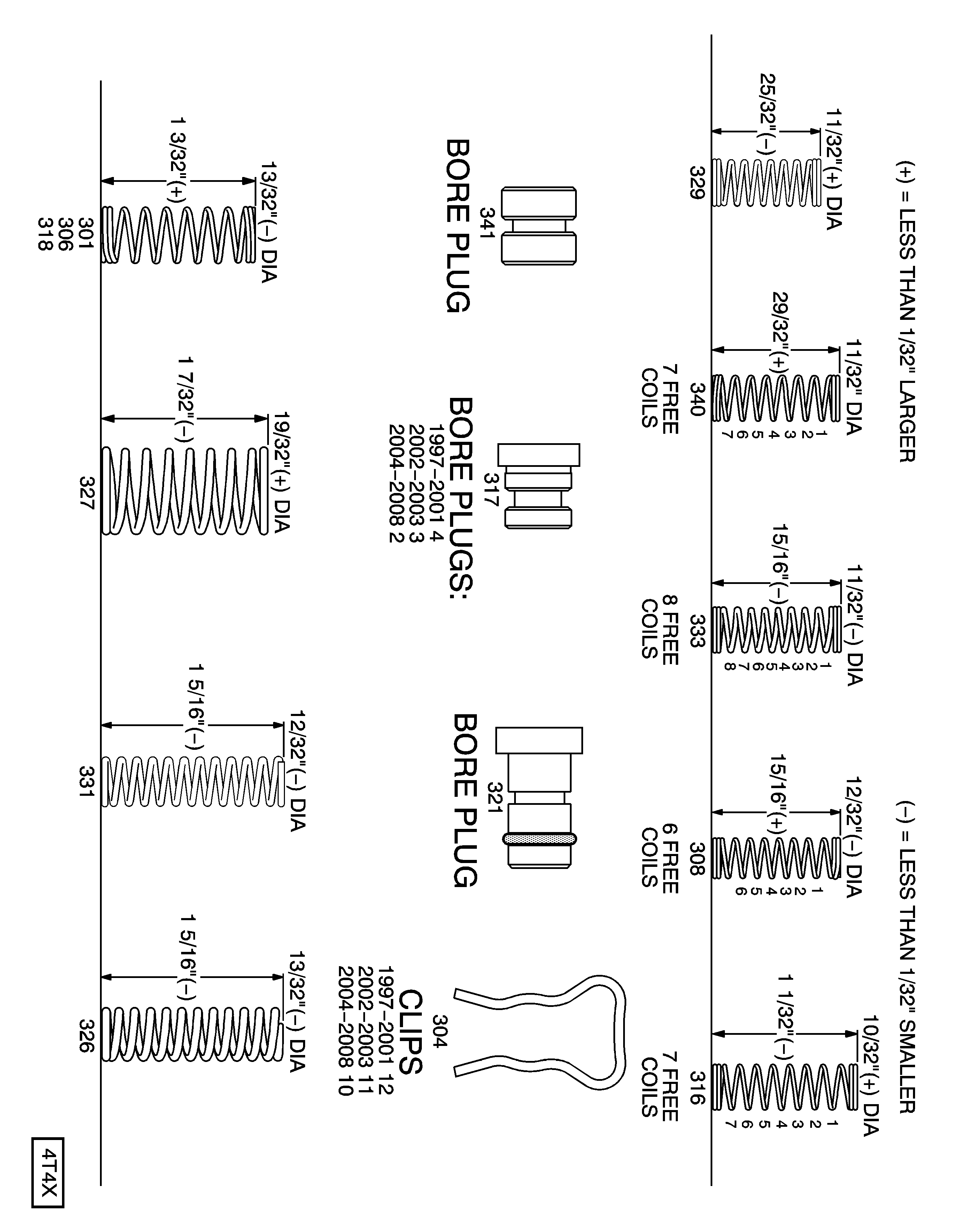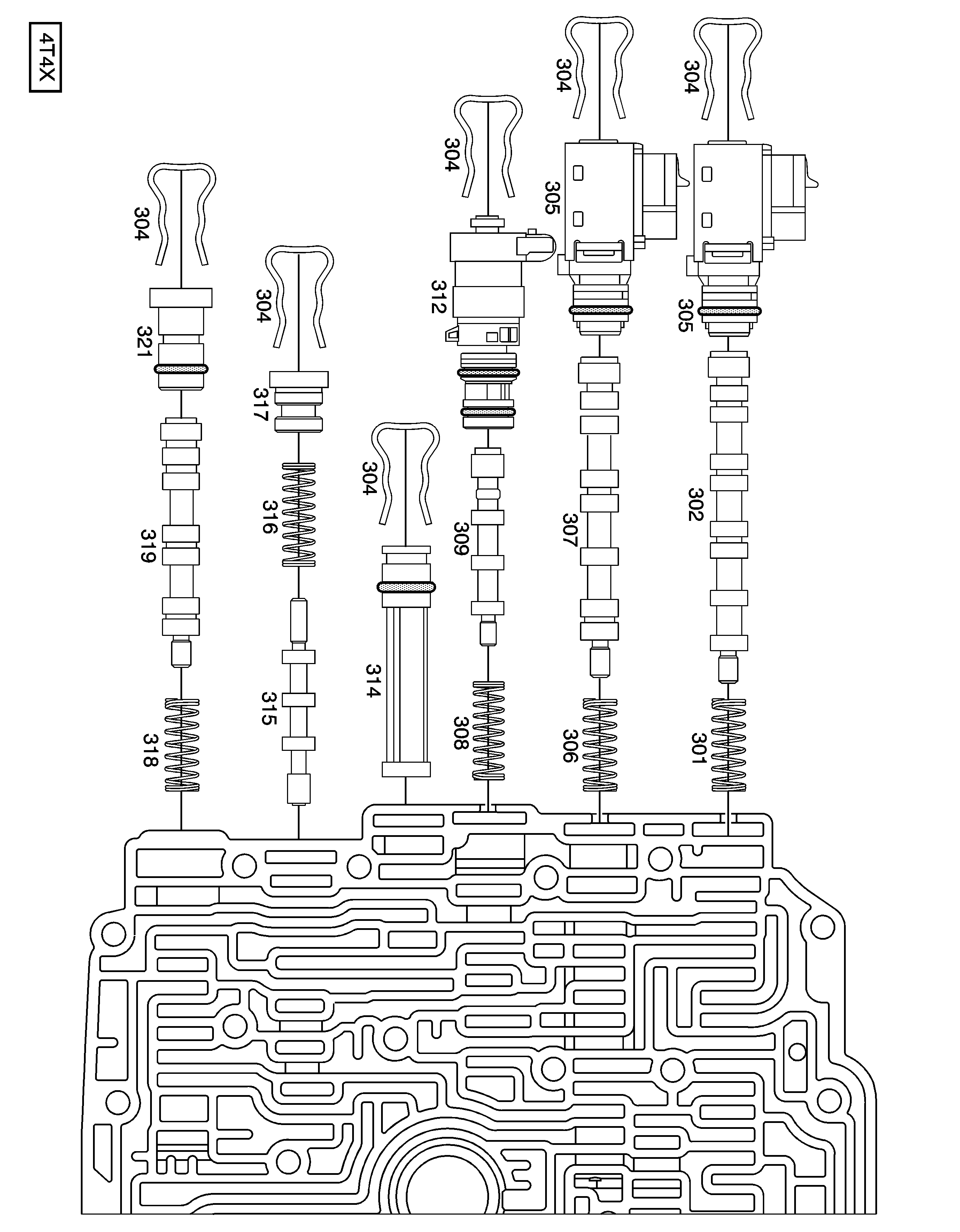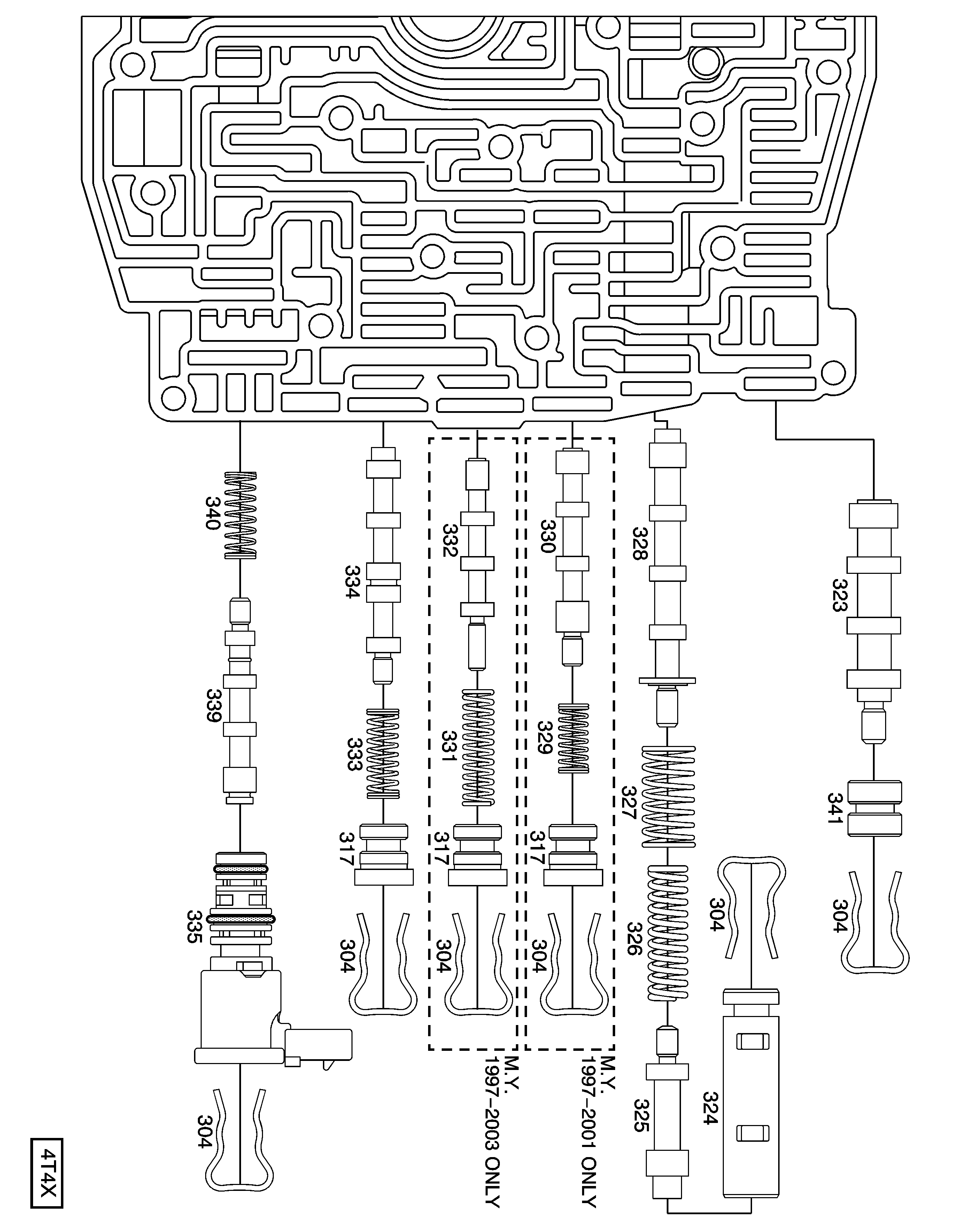Information on 4T40-E (MN4) and 4T45-E (MN5) Front Wheel Drive Automatic Transmission Valve Body Reconditioning DTC P0741, P0742, P0751, P0752, P0756, P0757, P1811, Harsh Shift, Slip, No Drive/Reverse

| Subject: | Information On 4T40-E (MN4) and 4T45-E (MN5) Front Wheel Drive Automatic Transmission Valve Body Reconditioning, DTC P0741, P0742, P0751, P0752, P0756, P0757, P1811, Harsh Shifts, Slips, No Drive, No Reverse |
| Models: | 1997-2005 Chevrolet Cavalier |
| 1997-2007 Chevrolet Malibu |
| 2005-2007 Chevrolet Cobalt |
| 2006-2007 Chevrolet Malibu Maxx, HHR |
| 1997-1998 Oldsmobile Cutlass |
| 1999-2004 Oldsmobile Alero |
| 1997-2005 Pontiac Sunfire |
| 1999-2005 Pontiac Grand Am |
| 2005-2006 Pontiac Pursuit (Canada Only) |
| 2005-2007 Pontiac G6 |
| 2007 Pontiac G5 |
| 2000-2005 Saturn L-Series |
| 2005-2007 Saturn ION, VUE |
| 2007 Saturn Aura |
| with Hydra-Matic® 4T40-E (RPO MN4) and 4T45-E (RPO MN5) Automatic Transmission |
The following new service information outlined in this bulletin will aid technicians in providing easy to follow valve body reconditioning instructions and new illustrations to simplify reassembly of the valve body. The service bulletin will also provide additional service information documents that are related to the 4L6x transmission family.
Related Service Documents
| • | PIP 3253B - No Move Drive or Reverse |
| • | 02-07-30-039F - Firm Transmission Shifts |
| • | 02-07-30-050 - Engineering Change Valve Body |
Important: If valve body cleaning is not required, Do Not disassembly bores unless it is necessary to verify movement of valves.
Inspection Procedure
- Using the exploded views in this bulletin, inspect each bore for freedom of valve(s) movement and evidence of debris. Pay particular attention to those valves related to the customer’s concern.
- Verify movement of the valves in their normal installed position. Valves may become restricted during removal or installation. This is normal due to small tolerances between the valves and bores.
- If a valve is restricted and cannot be corrected by cleaning valve and bore, then replace valve body. Describe restricted valve on repair order.
Valve Body Spring and Bore Plug Chart (Metric)

Valve Body Spring and Bore Plug Chart (Inch)


Left Side Control Valve Body Assembly
Call Out Number | Description |
|---|---|
301 | Spring, 1-2 Shift Valve |
302 | Valve, 1-2 Shift |
304 | Retainer Clip |
305 | Solenoid with O-Ring, 1-2 Shift Solenoid with O-Ring, 2-3 Shift |
306 | Spring, 2-3 Shift Valve |
307 | Valve, 2-3 Shift |
308 | Spring, Torque Signal Regulator |
309 | Valve, Torque Signal Regulator |
312 | Solenoid, Pressure Control with Two O-Rings and Screen |
314 | Filter, Actuator Oil |
315 | Valve, Actuator Feed Limit |
316 | Spring, Actuator Feed Limit |
317 | Plug, Bore |
318 | Spring, 3-4 Shift Valve |
319 | Valve, 3-4 Shift |
321 | Plug, Bore with O-Ring |

Right Side Control Valve Body Assembly
Call Out Number | Description |
|---|---|
304 | Retainer Clip |
317 | Plug, Bore |
323 | Valve, Accumulator |
324 | Bushing |
325 | Valve, Pressure Regulator Boost |
326 | Spring, Isolator |
327 | Spring, Pressure Regulator Valve |
328 | Valve, Pressure Regulator |
329 | Spring, 2-3 Accumulator Valve |
330 | Valve, 2-3 Accumulator |
331 | Spring, TCC Feed Limit |
332 | Valve, TCC Feed Limit |
333 | Spring, TCC Control Valve |
334 | Valve, TCC Control |
335 | Solenoid, TCC with Two O-rings |
339 | Valve, TCC Regulated Apply |
340 | Spring, TCC Regulated Apply Valve |
341 | Plug, Bore |
Notice: Be sure all solenoids are installed with the electrical connectors facing the non-machined (cast) side of the valve body; otherwise, the solenoids will bind against the transmission case as the valve body bolts are tightened and damage may occur.
Disassembly/Reassembly
- If a valve is restricted by a metal burr from machining that bore, remove valve and burr, then inspect movement in the valve’s normal position. If no other debris or restrictions are found, then reassemble valve body and install in the transmission.
- If the valve body has been contaminated with debris from another transmission component failure, then disassemble all bores for complete cleaning of all valve body components. If possible keep individual bore parts separated for ease of reassembly. Use the following illustrations in this bulletin for a positive identification and location of individual parts:
- Using GM Brake Clean, or equivalent, in a safe and clean environment (clean aluminum pan) clean the valve body and dry it with compressed air. Use appropriate eye protection.
- Clean individual valve body components with GM Brake Clean, or equivalent. Coat each valve with clean ATF and reassemble in each bore. Check each valve for free movement during assembly of each bore.
| • | Left Side Control Valve Body Assembly |
| • | Right Side Control Valve Body Assembly |
| • | Control Valve Body Assembly Chart, Valve Springs and Bore Plugs |
